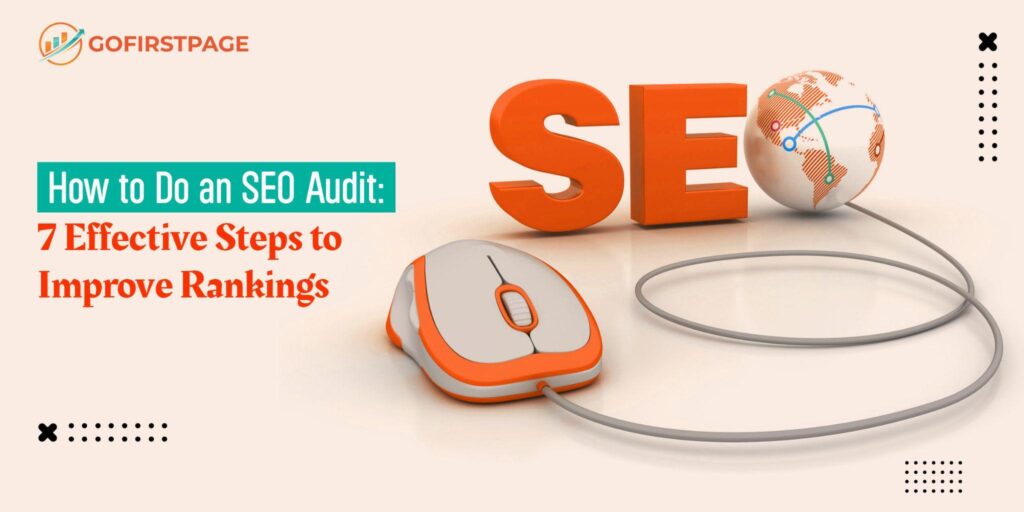Imagine you’re a small business owner who has just launched a brand-new website. You’ve spent countless hours crafting the perfect design, writing engaging copy, tweaking your product descriptions and adding more content, and creating stunning visuals to showcase your products or services.
However, after a few weeks, you notice that your website isn’t getting any traffic, you do not see the desired results, and your sales are low. You’re frustrated and confused and don’t know what to do.
Well, it’s time to consider an SEO audit. As we all know, search engine optimization has become crucial to any successful online marketing strategy in today’s digital age. Optimizing your website to rank higher on SERPs, drive more traffic and increase revenue.
SEO can be a complex and constantly evolving field, making it challenging for businesses to know if they’re doing everything they can to improve their online visibility. That’s where an SEO audit comes in. You can take the help of SEO expert agency Gofirstpage to build the right strategy and deliver fast results…
In this blog, we will explore what an SEO audit is, why it’s essential, and the best strategies and steps to conduct an SEO audit. So, let’s get started!
What is an SEO Audit?
It’s a way to check the health of your website to prevent spam and look at suggestions for optimizing it. An SEO audit evaluates your website’s search engine optimization (SEO) performance to identify any issues or areas for improvement.
It involves analyzing your website’s technical structure, content, and backlinks to identify any issues affecting your website’s visibility on search engines.
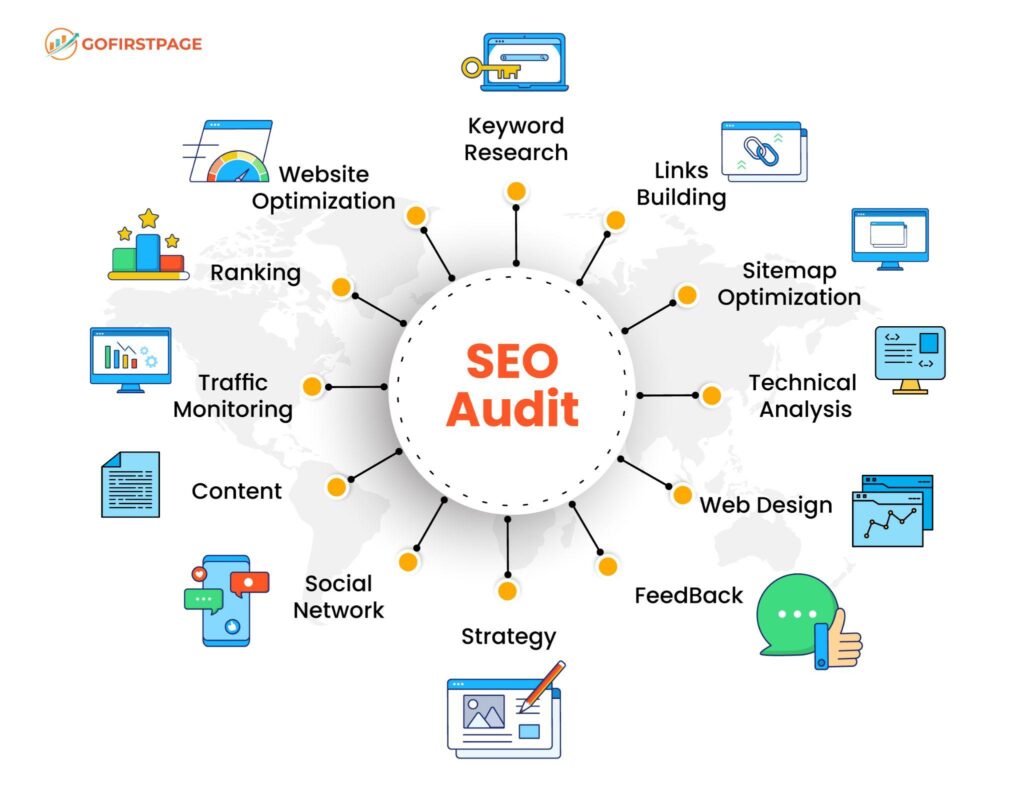
An SEO audit can be performed manually or using various tools available in the market. Manual audits require technical knowledge and experience, whereas tools make identifying technical errors and crawl issues easy.
Why is an SEO Audit Important?
SEO audits are important for many reasons, primarily because Google changes its algorithm frequently in accordance with new technology and search patterns. An SEO audit is crucial to the success of your website because it helps you identify any technical issues or gaps that could be hindering your website’s ranking on search engines. Identifying and fixing these issues can improve your website’s visibility, increase traffic, and drive more sales.
You must consider these three parts:
1) Auditing your site: focused on finding structural and technical problems preventing your site from performing better.
2) Internal content auditing: naturally within your site, but focusing on how to deliver the best content in your niche.
3) External auditing: focused on finding the problems and opportunities from other domains.
An SEO audit also helps you identify any penalties or algorithm updates that may have affected your website’s ranking. By staying updated with the latest SEO trends, you can adapt your strategy to stay ahead of the competition.
7 Effective Steps for SEO Audit to Improve Rankings
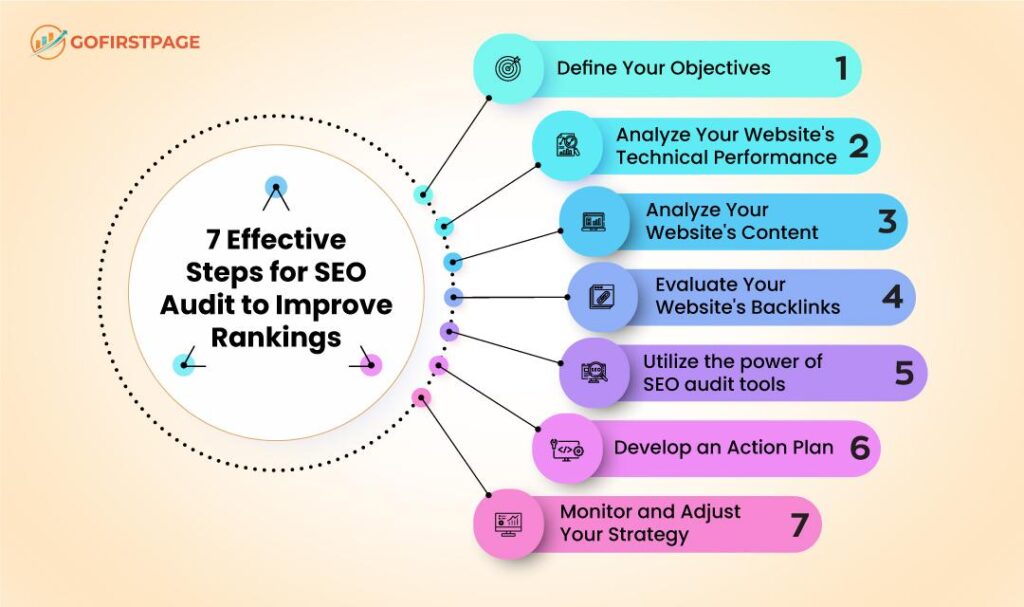
Now that you understand the importance of an SEO audit, let’s explore the best strategies and steps to conduct one.
Step 1: Define Your Objectives
Before diving into your website’s technical aspects, you must define your audit goals. What are you hoping to achieve from the SEO audit? Do you want to increase organic traffic, improve website speed, improve conversion rates, or identify technical issues? By defining your objectives, you can tailor your audit to focus on the areas that will significantly impact your website’s performance.
Step 2: Analyze Your Website’s Technical Structure & Performance
The next step is to analyze your website’s technical structure and performance. Conducting a technical SEO audit involves checking your website’s crawl ability, traffic, structure, internal linking, mobile-friendliness, page speed, bounce rate, conversion rate, URL structure, architecture, and other key metrics.
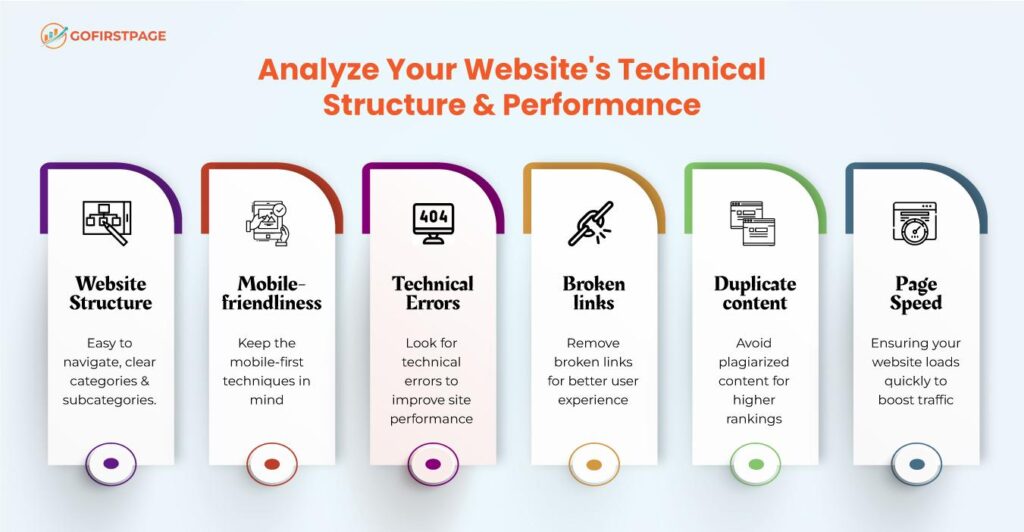
Some critical technical elements to analyze include:
1. Website Structure: Make sure your website is easy to navigate, with clear categories and subcategories. Use internal linking to connect pages and improve user experience.
2. Mobile-friendliness: With over half of all internet traffic coming from mobile devices, having a mobile-friendly website is crucial. Use tools like Google’s Mobile-Friendly Test to check your website’s compatibility.
3. Technical Errors: Look for technical errors hindering your website’s performance, such as broken links or duplicate content.
4. Broken links: Broken links can negatively impact UX and lead to a higher bounce rate.
5. Duplicate content: Plagiarized content can negatively impact your website’s ranking on search engines.
6. Page Speed: Website speed is a critical ranking factor, so ensuring your website loads quickly is essential. Use tools like Google’s PageSpeed Insights to identify areas for improvement.
You can use tools like Google Analytics or SEMrush to understand better how your website is performing and where there may be room for improvement. Let our professional SEO audit experts help you do this technical task easily. Call us now @ +1 (917) 277-7780 or Email us at info@gofirstpage.com
Step 3: Analyze Your Website’s Content
In addition to the technical aspects of your website, it’s essential to analyze your website’s content. This includes looking at your website’s keywords, relevance, meta descriptions, quality, alt tags, etc.
Some critical content elements to analyze include:
1. Keyword research: Conduct keyword research to identify the keywords your target audience is searching for.
2. Content relevance: Ensure your content is relevant to your target audience and provides value.
3. Meta Descriptions: Make sure each page on your website has a unique and descriptive meta description that accurately reflects the page’s content.
4. Content quality: Ensure your content is well-written, engaging, and error-free. Look for opportunities to improve the quality of your content by adding more in-depth information, incorporating multimedia, and optimizing for user intent.
Step 4: Evaluate Your Website’s Backlinks
Backlinks are a crucial ranking factor for search engines, so evaluating your backlink profile as part of your SEO audit is essential. This includes checking the number of relevant & quality backlinks pointing to your website and identifying any low-quality or spammy links that may hurt your website’s performance.
Tools like Ahrefs or Majestic can help you analyze your backlink profile and identify areas for improvement. Focus on building high-quality, relevant backlinks from reputable sources to improve your website’s search engine rankings.
Critical backlink elements to analyze include:
1. Link quality: Ensure your website has high-quality backlinks from reputable sources.
2. Link relevance: Ensure your website’s backlinks are relevant to your niche and target audience.
3. Anchor text: Ensure your website’s anchor text is diverse and relevant to your content.
Step 5: Utilize the power of SEO audit tools
While conducting an SEO audit manually is possible, it can be time-consuming and challenging for those without technical knowledge. Utilizing SEO audit tools can help speed up the process and identify issues that may be overlooked during a manual audit.
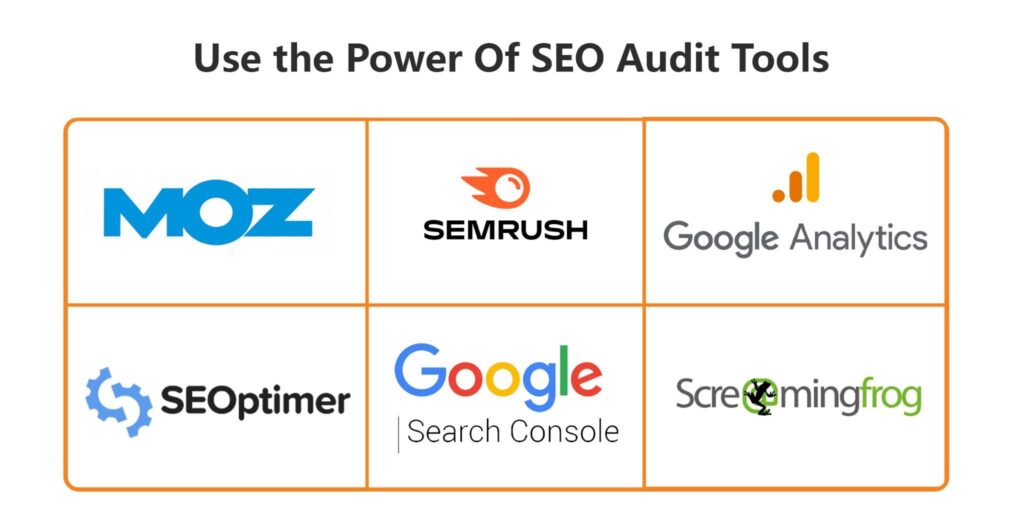
Some of the best SEO audit tools include:
1. SEMrush: SEMrush provides insights into your website’s keyword rankings, backlinks, and competitors.
2. Google Analytics: Google Analytics provides insights into your website’s traffic, user behavior, and conversion rates.
3. SEOptimer: It will go through rank analysis, link-building structures, trust metrics, and authority baseline. It will also assess your site’s overall speed and user-friendliness.
4. Screaming Frog’s SEO Spider: You can crawl up to 500 URLs for free. This tool will carry out an analysis for you.
5. Check My Links: This extension tool allows you to check your links to ensure they all work in favor of traffic rather than against it. 6. Google Search Console: Google Search Console provides insights into your website’s performance on search engines and identifies any issues hindering your ranking.
Step 6: Develop an Action Plan
Once you’ve completed your SEO audit, it’s time to create an action plan. This plan should outline the steps you need to take to improve your website’s performance based on your audit findings. It involves prioritizing your findings and creating a plan to address any issues or gaps identified during the audit. Prioritize the most critical areas for improvement, and set realistic goals and timelines for each task.
Some common areas that require attention during an SEO audit include:
1. Fixing technical errors on your website
2. Improving website speed
3. Updating & optimizing your website’s content to target your audience better
4. Building high-quality backlinks to your website
5. Fixing broken links 6. Optimizing your website for mobile users Developing a realistic action plan that addresses the critical issues and aligns with your objectives is essential.
Step 7: Monitor and Adjust Your Strategy
Finally, monitoring and adjusting your SEO strategy over time is essential. SEO is a continuous process, and staying up-to-date with the latest best practices and algorithm updates is vital to stay ahead of this competition. Monitor your website’s performance using tools like SEMrush or Google Analytics, and adjust your strategy as needed to ensure you’re meeting your goals.
The Bottom Line
An SEO audit is essential for any website owner or digital marketer as it’s crucial to a successful SEO strategy. While conducting an SEO audit may seem daunting, it’s worth investing time and resources to ensure your website performs at its best.
By analyzing your website’s performance, technical issues, areas for improvement and creating an action plan, you can improve your website’s search engine rankings, backlink problems, content gaps, drive more traffic & sales, and ultimately increase revenue.
Remember to define your objectives, analyze your website’s technical structure, content, and backlinks, utilize SEO audit tools, and develop an action plan. Applying the above steps, you can take your SEO strategy to the next level by conducting an effective SEO audit and improving your website’s search engine optimization performance.
FAQs
Que: What is an SEO audit?
Ans: An SEO audit is a comprehensive evaluation of your website’s technical structure, content, and backlinks to identify areas for improvement and optimize your website’s search engine visibility.
Que: Why is an SEO audit important for my website?
Ans: SEO audit is essential because it helps you understand how search engines perceive your website, identify issues such as technical errors, duplicate content, low-quality backlinks, slow loading times, and poor mobile responsiveness, and provides actionable recommendations to improve your online presence, drive more traffic, and generate leads and sales.
Que: How often should I conduct an SEO audit?
Ans: Conducting an SEO audit at least once a year is recommended to ensure your website remains optimized for search engines. However, if you’ve made significant changes to your website, such as redesigning or rebranding, conducting an audit is a good idea to identify any issues or areas for improvement. You can use several tools for conducting an SEO audit, such as Google Analytics, SEMrush, Moz, Ahrefs, and Screaming Frog.
Que: How can I optimize my website’s technical structure?
Ans: To optimize your website’s technical structure, you can focus on factors such as page speed, mobile responsiveness, URL structure, internal linking, and schema markup.
Que: What is content optimization, and how does it improve a website’s search engine visibility?
Ans: Content optimization involves optimizing your website’s content for search engines by incorporating relevant keywords, creating high-quality content, and optimizing meta descriptions and title tags. It can improve your website’s search engine visibility by making it more relevant and valuable to users.
Que: How can I improve my website’s backlink profile?
Ans: To improve your website’s backlink profile, you can create high-quality, relevant content, build relationships with other websites in your industry, and use link-building strategies such as guest blogging and broken link building.
Que: Can I conduct an SEO audit myself, or do I need to hire an SEO agency?
Ans: You can conduct an SEO audit yourself if you have the necessary expertise and tools. If you do it yourself, you must measure the success of an SEO audit by tracking metrics such as organic traffic, search engine rankings, bounce rate, and conversion rate. However, hiring an SEO agency can provide access to specialized expertise and tools, objective analysis and recommendations, and the ability to focus on your core business activities.

